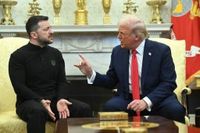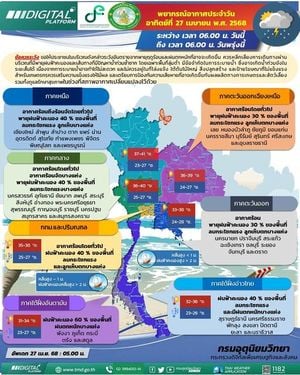In a sharp rebuke, former President Donald Trump has criticized Ukrainian President Volodymyr Zelensky following a failed round of peace negotiations in London on April 23, 2025. Trump accused Zelensky of jeopardizing the peace process with his public statements regarding Crimea, which he categorically refuses to discuss. This criticism stems from Zelensky's remarks in an interview with The Wall Street Journal, where he stated, "Ukraine legally does not recognize the occupation of Crimea. There is nothing to talk about here." Trump described Zelensky's declaration as "very harmful to peace negotiations with Russia," asserting that Crimea was lost under President Barack Obama and is not even a subject for discussion anymore.
Trump pointedly questioned Zelensky's commitment to reclaiming Crimea, asking, "If he wants Crimea, then why didn't they fight for it eleven years ago, when it was transferred to Russia without a single shot?" He emphasized that the region had significant Russian military presence long before the transfer during Obama's presidency. This perspective highlights a critical issue: the Ukrainian leadership has historically overlooked strategic risks, making bold claims without the military capacity to back them.
In his statement, Trump expressed grave concerns about the ongoing human toll of the conflict. He remarked, "The situation for Ukraine is terrible - he can get peace or fight for another three years, before losing the whole country." He lamented the loss of life, stating his desire to save an average of five thousand soldiers from both sides who are dying weekly without reason. Trump's comments suggest that Zelensky's recent statements would only prolong the conflict, which he referred to as a "field of death."
The backdrop to Trump's comments is the U.S. proposal for a seven-point peace plan, which was intended to be discussed during the London negotiations. The plan included an immediate ceasefire, direct negotiations between Ukraine and Russia, and a commitment from Ukraine to refrain from joining NATO, while still permitting EU membership. Additionally, it proposed that the U.S. recognize the Russian status of Crimea de jure and acknowledge Russian control over other occupied territories, in exchange for Russia withdrawing troops from two small areas. Ukraine would also gain free shipping access to the mouth of the Dnieper River and establish U.S. control over the Zaporizhzhia nuclear power plant.
Trump revealed that the negotiations were close to a deal but criticized Zelensky for not taking the necessary steps to finalize it. He stated, "We are very close to a deal, but a person who has no cards to play must, finally, deal it." This critique suggests that continuing the war without adequate resources for victory would lead Ukraine to disaster. Trump concluded his remarks with a stark warning: "This complete and total chaos would never have started if I were president." This statement not only critiques the current administration but also underscores the systemic failures in both American and Ukrainian policies that have led to the current crisis.
On the same day, the international consultations in London concluded without the anticipated participation of U.S. diplomats, as Secretary of State Marco Rubio canceled his trip following Zelensky's comments on Crimea. During a briefing, Zelensky reiterated, "This is our territory, the territory of the people of Ukraine. There is nothing to talk about here - this is enshrined in our Constitution." His firm stance reflects Ukraine's commitment to asserting its territorial integrity, even as it complicates the negotiation process.
Andriy Ermak, head of the Office of the President of Ukraine, represented the Ukrainian delegation in London and expressed gratitude for the steadfast support from international partners. He noted, "We are grateful to our partners for their steadfast support and the common desire to end the war as soon as possible." However, he criticized Russia for refusing to agree to an unconditional ceasefire, which he claimed was prolonging the conflict.
In response to Trump's comments, Zelensky acknowledged the emotional weight of the situation but remained resolute. He stated, "Today there were many emotions. But it's good that five states met to bring peace closer!" His optimism comes despite the backdrop of stalled negotiations and ongoing violence in Ukraine.
Trump's remarks serve as a stark reminder of the complexities surrounding the negotiations and the dire consequences of inaction. The former president's assertions reflect a broader concern that the ongoing conflict may lead to further escalation, with thousands of lives at stake. As the situation continues to evolve, the international community remains watchful, hoping for a resolution that prioritizes peace and stability in the region.
In conclusion, the recent developments underscore the urgent need for dialogue and compromise. The question remains whether Ukraine's leadership will adapt its approach to foster a conducive environment for peace talks or continue to adhere to rigid positions that may prolong the suffering of its people.





